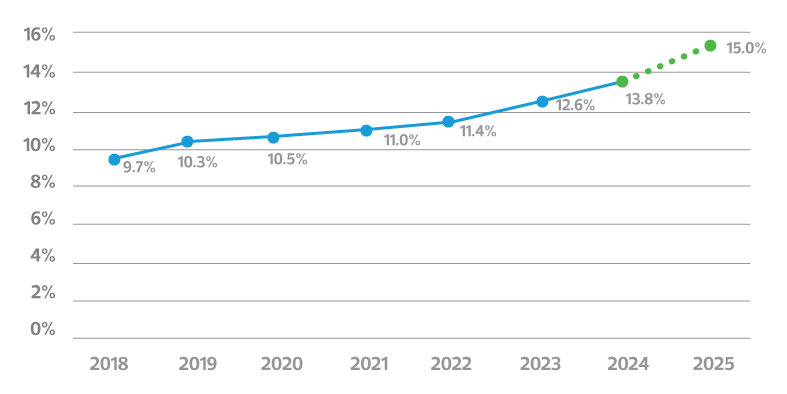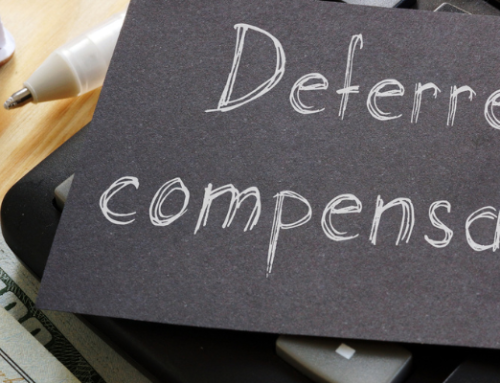Source: RSM US LLP.
ARTICLE | January 30, 2024
The U.S. government is the largest purchaser of goods and services in the world. With that distinguished position comes the responsibility to steward taxpayer dollars thoughtfully.
A longstanding initiative the government has supported is the ability of small businesses to compete and win federal work—particularly those majority owned by socially and economically disadvantaged groups. The government classifies these companies as small disadvantaged businesses (SDBs). Businesses qualify as SDBs based on two factors:
- The North American Industry Classification System code assigned to the contract
- Ownership by a member of a race or ethnicity that has been subject to prejudice or cultural bias within American society
The government wants to see a diverse population of small business owners thrive.
What gets measured gets done
The Small Business Administration (SBA) 8(a) business development program partners with federal government agencies to ensure SDBs have access to federal government contracts through set-aside and sole-source contracts. The program also provides business development support and mentorship opportunities, access to procurement and compliance experts, free training, and other benefits.
The Small Business Act mandates at least 5% of federal contract dollars go to SDBs. Historically, procurement goals were set to outperform the requirement, targeting 10% of federal contract dollars to SDBs.
A growing slice of a growing pie
In December 2021, the Biden administration announced a new goal: to increase the percentage of federal contract dollars going to SDBs to 15% by government fiscal year 2025. The administration also committed to releasing disaggregated data, sorted by the race/ethnicity of business owners, to tap into the power of transparency and accountability. By the end of government fiscal year 2022 (ending Sept. 30, 2022) the upward trajectory continued according to plan.

Source: U.S. Small Business Administration, RSM US LLP
Not only are SDBs getting a larger slice of the pie, but the pie is expected to grow. U.S. industrial policy decisions and the resulting legislation—such as the Infrastructure Investment and Jobs Act, Inflation Reduction Act, and CHIPS and Science Act—have increased opportunities.
The Biden administration has made meaningful investments in infrastructure, clean energy and advanced technologies. The government wants a multiplier effect on those investment dollars. The goal is to build things we need in a way that supports segments of our population we want to flourish. Such investments maximize their impact when individual business owners succeed and, in turn, spur increased innovation and competitiveness across the country.
Strings attached
With greater opportunity, though, comes greater responsibility. The federal government has heightened its standards of doing business to encourage good stewardship of taxpayer dollars and ensure our nation remains safe and secure. That means new federal government contractors must be prepared for the regulations attached to the opportunity. These regulations cover functions such as finance, accounting, cost estimating, technology, data security, cybersecurity, operations and supply chain, bid and proposal, corporate development, legal, and more. Following regulatory requirements is essential for any SDB.
Politics matter
Congress amended the Small Business Act in 1978 to make the 8(a) program what is today. That means the decades-old program has spanned a variety of presidential administrations and right- and left-leaning legislative bodies. While this is an impressive run, risks to the program exist.
In July 2023 the U.S. District Court for the Eastern District of Tennessee enjoined the SBA from assessing eligibility for the 8(a) program. The program continued under newly issued Department of Justice guidance that changed requirements related to establishing eligibility by submitting a social disadvantage narrative. This challenge thus far has resulted in heightened compliance and documentation requirements—something federal government contractors are constantly navigating. However, there is always the possibility of more meaningful encumbrances from legislators or court decisions in the future.
It takes a village
Programs for new company formations are in place, but that is only part of the journey. The government wants to see these businesses thrive and graduate from SDB set-aside status into mature, growing concerns. This could mean graduating from the 8(a) program, growing in excess of small business standards and, ultimately, competing in a full and open environment.
In a market without contract set-asides, you’re measured against large, diversified peers on capability, past performance, expertise, intellectual property, and the ability to innovate and solve the world’s most challenging problems. This is a considerable challenge in a competitive, ever-consolidating ecosystem. Many businesses struggle to successfully cross this chasm. Therefore, as an ecosystem, everyone has a part to play in expanding our horizons by supporting SDBs and the perspectives they bring to the mission. This includes prime contractors, investors, advisors, financiers, lobbyists, legislators, and procurement experts, to name a few.
Today, the government provides opportunities for members of ethnic minority and disadvantaged groups—especially those with an entrepreneurial spirit—to drive change, innovate and reimagine our future. We benefit as a nation when all people have the opportunity to thrive—increasing competition, diversifying perspectives and innovating together. When this is achieved in the government contracting ecosystem, we not only improve productivity and economic output, but we increase national security and achieve preeminence on the global stage.
This article was written by Luis Avila, Stephanie Smith and originally appeared on 2024-01-30. Reprinted with permission from RSM US LLP.
© 2024 RSM US LLP. All rights reserved. https://rsmus.com/insights/industries/government-contracting/federal-government-contracting-is-an-opportunity-for-minority-business-owners.html
RSM US LLP is a limited liability partnership and the U.S. member firm of RSM International, a global network of independent assurance, tax and consulting firms. The member firms of RSM International collaborate to provide services to global clients, but are separate and distinct legal entities that cannot obligate each other. Each member firm is responsible only for its own acts and omissions, and not those of any other party. Visit rsmus.com/about for more information regarding RSM US LLP and RSM International.




